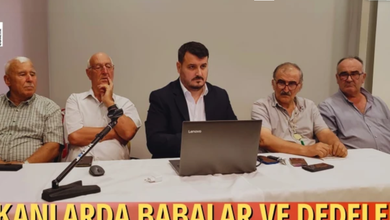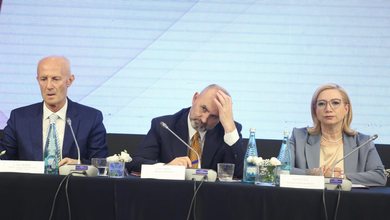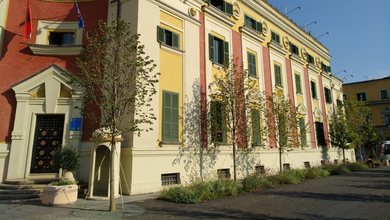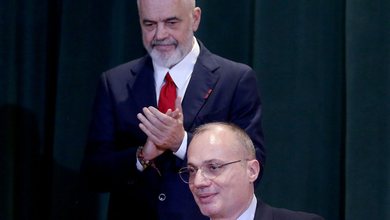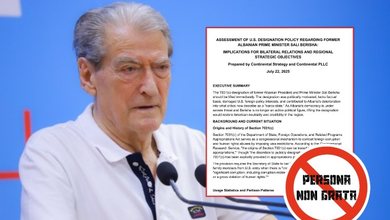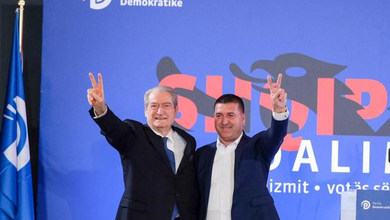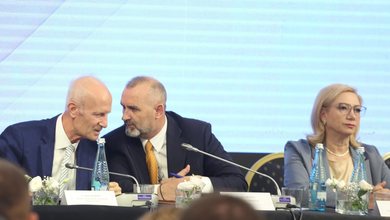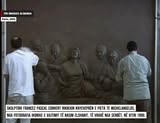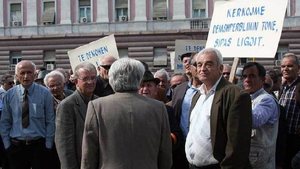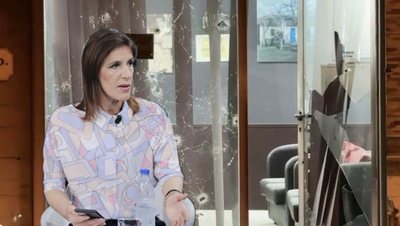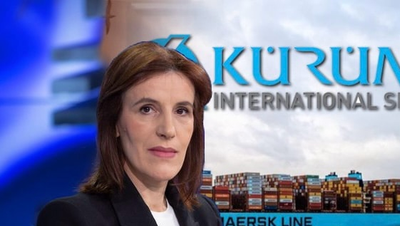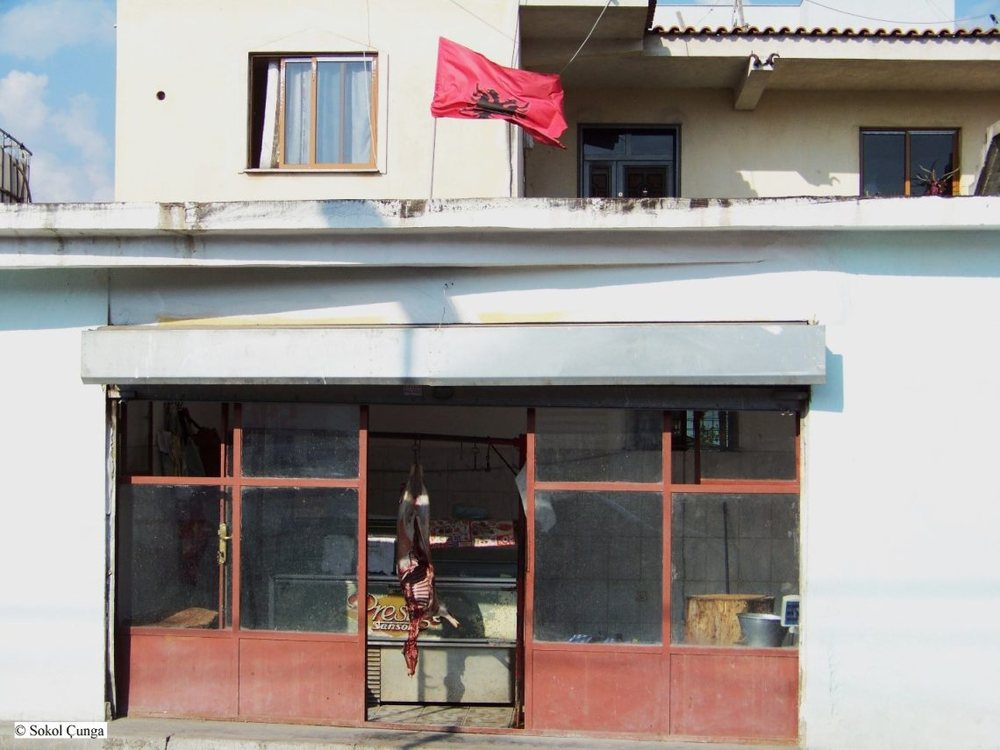
Clearly, this strengthening of criminal measures in favor of national symbols does not come as a result of patriotic devotion, but as a need to emphasize nationalism, to justify Point 2 of the article in question. Which means, at the same time, that national symbols are being used as a shield and justification for another element that strongly favors nationalism: censorship in the name of the People.
The new Criminal Code, prepared by a group of specialists in the field, in cooperation with state institutions under the coordination of the Ministry of Justice, was completed in 2023, but was presented on July 25, 2025. Authorities and specialists participated in the presentation ceremony. After the circulation of the draft code, criticism was immediately expressed about its content and incompatibility with the European Union guidelines. Meanwhile, among the important issues related to the rights of freedom of speech, many journalists also noticed Article 235 of the draft code, the criminalization of mockery and contempt of state leaders. However, what caught my attention in that article was not only Point 2, which had not been in the previous Criminal Code, but the elaboration of Points 1 and 3, as well as the addition of Points 4 and 5. I quote:
Article 235
Desecration of the Republic and its symbols
Desecration of the National Anthem, the flag or the coat of arms of the Republic displayed in state institutions constitutes a criminal offense and is punishable by a fine or imprisonment of up to six months or, no less than two additional sentences when it is deemed that the purpose of the criminal punishment is achieved through them.
Desecration of the Republic, the President, the Assembly, the Council of Ministers, the Constitutional Court or the judicial system, the armed forces or the martyrs of the Homeland is punishable by imprisonment of up to three years.
Public desecration of the Albanian Nation is punishable by imprisonment of one to four years.
If the desecration according to the paragraphs above is committed during a public holiday or official ceremony, it is punishable by imprisonment for up to four years.
For the purpose of this law, desecration shall mean the violation of something sacred, high moral qualities or universally respected values, the humiliation, rendering useless, contempt, mockery, denigration, or contempt of the institutions mentioned in this provision.
Meanwhile, for comparison, the existing Criminal Code (Law No. 7895, dated 27.1.1995, as amended) is completely inadequate in the relevant article with only 1 point. I quote:
Article 268
The humiliation of the Republic and its symbols
The humiliation, publicly or through publications or distribution of writings, of the Republic of Albania and the constitutional order, of the flag, the emblem, the national anthem, the martyrs of the nation or the removal, damage, destruction, rendering indistinguishable or unusable of the flag or the emblem of the Republic of Albania displayed by official institutions, constitutes a criminal offense and is punishable by a fine or imprisonment of up to two years.
As far as I could read these days, I did not see anything written about this tightening of the law regarding the humiliation of the symbols of the Republic, the anthem and the flag. Among the memes that were circulating, the ridicule and mockery addressed to the Prime Minister, the increase in the nationalist spirit did not seem to concern me. And, with reason, the question arises: why?
In 1995, Michael Billing, a professor of social sciences, published a monograph entitled Banal Nationalism, in which he examines all the forms of nationalism that we encounter everywhere and take for granted, without noticing that they are forms of reinvention of nationalism and the nation-state. Flags on government or private buildings, state emblems or national symbols on objects of daily use (seals, stamps, tickets, banknotes, etc.), the discourse labeling “us” as opposed to “them” of another ethnicity, etc., are banal forms of nationalism. In the same vein come national holidays, those that, as if on command, ignite patriotic fervor for a few hours, a day or a “white night”, and all that remains in people’s memory are the fireworks, the concert of that holiday, or how many cocktails without a national base were drunk that day off. The speakers are dismantled, the lights are turned off, the flags are forgotten until the next party.
In the context of banal nationalism, what is worth noting in Article 235 of the draft code is the increased worship of the flag, anthem and national symbols. For a simple reason, I would consider this form of nationalism simply banal, and not aggressive nationalism: in the Albania where we live, we have not yet seen anyone punished for desecrating national symbols. While state ceremonies take place either behind closed doors or in an open environment, no one has desecrated what the Code considers inviolable. So, simply, reality does not confront us with any need to toughen the laws in order to limit the desecration of national symbols. Meanwhile, the draft code completely changes the way of thinking about national symbols, paraphrasing them as sacred, in the theological sense of the word.
Here, some quite natural questions arise: Will ignorance of the lyrics of the National Anthem or the singing of the Anthem by those who are not prepared to sing and, nevertheless, try it be penalized? Will it be considered a violation of the Code when the orchestra playing the Anthem, usually a brass band paid for by local taxes, clearly plays the wrong notes (as I have heard myself more than once)? Will action be taken against those artistic productions of any form, in sound, image and text, that use the National Anthem in an ironic or useless way? What happens when national symbols are used in works of art, or are they simply used to say something when someone has nothing to say? Will fans who wear national flags around their necks or throw them over their shoulders, like beach towels, at any sporting event be penalized? Will those who wrap their vehicles with the national flag be penalized while celebrating the goals of the national team? And if someone wants to wave another flag, different from the one established by the Constitution, but with purely national purposes, what will happen? Because, for anyone who has followed the history of the flag and national symbols with professional curiosity or simply as an amateur, it is clear that this flag we have and this coat of arms of the Republic are the next variants of the flags and coats of arms used in, let's say, a century and a half. I am also reminded of the personalized masks with the double-headed Albanian that quite a few state institutions produced during the Covid-19 period in 2020-2021. Will we be able to produce masks with an eagle again, if necessary, without being punished? Also, what will happen to the flags honored on the facades of state institution buildings that wave like rags bleached by the sun and weathered by atmospheric agents?
Although it is clear, for anyone who knows the logic of the law, that the Criminal Code has a certain geographical competence, the question still remains: what happens to those Albanians or foreigners who desecrate national symbols of other republics, committing a criminal offense related to the national feelings of a friendly country? Will law enforcement institutions notify their counterparts about this violation, turning a local issue into an international issue? The draft code does not take a position on this. But clear reason still has the right to ask: why not?
What attracts attention and seems strange in Point 2 of Article 235 of the draft code is the placement of the martyrs of the homeland immediately after the state authorities and the Armed Forces. Like a victorious army, the memory and bodies of those who fell for the national ideal close the line of the living, joining them on the long tribune of the state authorities. I imagined the martyrs (whose number I hesitate to quote, so as not to take revenge on Hadi) as angelic forces around the next photograph of the 2025-2029 government cabinet, untouchable by any hand, tongue or feather of the villain. Now they are protected by a special article, since, it seems, Articles 863, 865, 866 and 867 of the draft code in question were not enough, which penalize the desecration of the memory of the deceased and the desecration of graves. Because, as Klejd Këlliçi explains very well in his study A Funeral for Every Regime (Berk, 2023), regimes in Albania are founded and raised over the bones of the dead.
Clearly, this strengthening of criminal measures in favor of national symbols does not come as a result of patriotic devotion, but as a need to emphasize nationalism, to justify Point 2 of the article in question. Which means, at the same time, that national symbols are being used as a shield and justification for another element that strongly favors nationalism: censorship in the name of the People. This was clearly stated and argued by many journalists and lawyers during the last week of July 2025. If this draft code is approved as it is, its Article 235 will be the first desecration of the Republic and its symbols. Even if it is not approved, this article will remain a sign of the use of national symbols for the narrow benefit of politics. In itself, this misuse of national symbols for the benefit of politics is also part of the politician's classic game with national symbols. At one point it seems as if the draft code was not drafted by specialists, but by politicians, who use nationalist rhetoric whenever the need arises to justify their dubious or illegal actions. To put it in Billing's words: "In the rhetoric of the new world order, the theoretical consciousness of nationalism is reproduced in the banal and commonplace clichés of the contemporary politician."
I return to the draft code and read Article 235, point 5: “For the purpose of this law, desecration shall mean the violation of something sacred, high moral qualities or universally respected values, the humiliation, rendering useless, contempt, mockery, desecration, or contempt of the institutions mentioned in this provision.” Beyond the name “institutions”, which is clearly understandable, what are “something sacred”, how are moral qualities legally defined? When we say “universally respected values”, which world are we talking about, which values? Anyone who has read or studied anthropology at all knows that these concepts vary greatly from country to country. If by “worldwide” we mean the countries with the largest populations in the world, will the draft code determine whether we will adopt the values of the USA, China or India? How is desecration carried out, in the sense of the law, physically or metaphorically? If desecration is metaphorical, then, aren't the terms "contempt" and "contempt" enough? Joking aside, anyone who has studied and is proficient in at least one foreign language at an academic level clearly understands that here we are dealing with a mechanical translation, carried out by someone who knows neither the language nor the law. However, when this text is served to us by the Ministry of Justice, the institution that licenses the official translators of this country, we cannot laugh at the poorly done work. If the draft law had had a little more imagination and had criminalized the inability to master the Albanian language and its desecration, placing the language alongside national symbols, surely the drafter of the above article would have been convicted of desecration of national symbols.
The time has come to address the why we decided above: why was the strengthening of the nationalist spirit not articulated as a concern? The fact that until the moment of writing, public discussions have not paid special attention to increasing the punishment for desecration of national symbols suggests that we have a consensus of opinion on this issue: national symbols must be protected by law even more strictly than in the past. Francis Fukuyama wrote in 1992 (The End of History and the Last Man) that nationalism was one of those old ideologies that would disappear within the new liberal global order. However, Billing continues a little later, perhaps liberal democracy will not eradicate nationalism, but, on the contrary, will consolidate banal nationalism, where national symbols are transformed into a mysticism of the country and the people. In the case in question, this nationalism is banal precisely because it escapes the net of even the strictest and most vigilant critics of my country.
Also, while the draft code does not refer to the desecration of national symbols of friendly countries, the comment that Billing would make remains valid: "our" nationalism is good, it is patriotism. While "they", all the others who are not "us", are not patriots, they are nationalists and, consequently, do not deserve to be protected by us.
In the end, I feel it is useful to note that what I see does not disappoint me. I do not harbor the illusion that Albanians are or will become pioneers and examples of responsibility, even when it comes to national symbols. One of the reasons is precisely the lack of maturity to break away from the patterns of the past. Thus, Albanians faithfully reinvent themselves. The new legal framework, reminiscent of the dictatorship of the proletariat, could not leave nationalism (banal or not) outside the framework, could not forget the martyrs, the living characters of the fable where "Albanians open the path of history with swords in hand". If you consider that, while the cream of the lawyers (as I read, not that I have the professional capacity to judge them) who prepared the draft code operate with these anachronistic mindsets and concepts, the hopes that Albanians with simple vocational education (or without any specific education) will be Europeanized should be postponed well beyond 2030. /BIRN/


